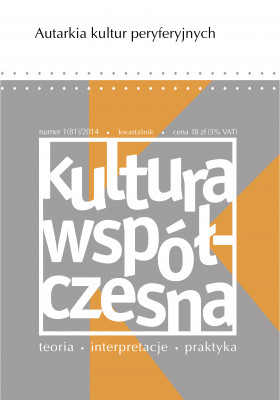Settings and search
Peripheral cultures autarky


Table of contents
I PERIPHERAL CULTURES AUTARKY
Roman Chymkowski, Błażej Popławski
Peripheral cultures’ autarky – between eudaimonia and political ideology
Renata Włoch
(Un)successful renegotiations of peripheriality: globalization, its actors and great sports events
Błażej Popławski
About a third world writer, who undermined first world rhetoric. Analysis of literary and ideological legacy of Ngũgĩ wa Thiong’o
Roman Chymkowski
The Arab Awakening, modernization and postcolonialism
Jakub Urbański
Mountains high, cesar far. Yunnan province as periphery of China
Łukasz Jasina
Ukrainity. An assay to describe
Marcin F. Gawrycki
Mexican gaze at „Mexican cuisine”
Ewa Klekot
Self-folclorization: contemporary folk art through the perspective of postcolonial criticism
Katarzyna Górak-Sosnowska
Alladyn X’s erotic dreams and other facets of porn-orientalism
II CULTURAL STUDIES WORKSHOPS
Sylwia Jarmuż
”Reality denunciations” and ”objects revolutions”. About love, responsibility and courage in Piotr Cieplak’s theater
Aleksandra Derra
Do science and technology hate women?
III REVIEWS
Łukasz Morawski
Towards a multipolar world
Błażej Popławski
The Specter of capital is haunting the peripheries
Łukasz Zaremba
Delirious Łódź? About Łukasz Biskupski’s Miasto atrakcji
Wojciech Śmieja
Media identities, sexual capital, new tastes
Witold Zakrzewski
Kultura a rozwój – first step book
IV REPORT
Aleksandra Kil
Multivocality of (Wroclaw’s) sound landscape
Dariusz Skonieczko
Poles in world peripheries
Peripheral cultures autarky
Peripheral cultures’ autarky – between eudaimonia and political ideology
- Roman Chymkowski, Błażej Popławski
The subject of the article are great sports events, cultural, economic and political phenomena, which have so far been on the margin of social sciences. While based on their examples it is possible to show how “aspiring developing countries” try to renegotiate their peripheral status. These countries perceive great sports events as an opportunity to mark their position within the global system of political and economic powers, to manifest their developmental potential and to show their particular cultures transferred into universally understood code. As they stand for election they also entangle into a complex, often neocolonial political and economic relations with global sports organizations, media and corporate sponsors and this requires endless negotiations of limits of their autonomy.
The main aim of the article is to show the literary and ideological legacy of Kenyan writer Ngũgĩ wa Thiong’o. His attitude towards nationalism, ethnicity, social memory, condition of the African state, the role of language in building collective identity are presented in the text. The evolution of Ngũgĩ’s worldview has been reviewed in context of postcolonial societies transforming – dilemmas closely related to center dichotomies interpretation – peripheries of „global village” and the challenges generated through process of modernization and acculturation.
The Arab Awakening (The Arab Spring) is a mass social movement embracing countries of Northern Africa and Near East. The main reason for the movement is political authority delegitimization connected with countries’ weakness in solving social problems. Literature of the subject emphasizes nonreligious character of The Arab Awakening, validating the false opposition of Islam and modernization. Meanwhile modern political thought inspired by radical Islam is not contrary to parliamentary democratization; it only rejects secularity and neoliberal capitalism. The West has stopped being the main point of reference for social modernization projects, local cultural heritage, especially Islam, reinterpreted in context of modern challenges, is becoming more important. Social activity of some Muslim fundamental organizations favors building frameworks of civic societies.
The text concerns problematic aspects connected to Chinese province of Yunnan located in the southwestern part of the country. Yunnan situated on the peripheries of Chinese civilization has for many years been put of attention from Cesar authorities – people dwelling the area managed to shape their own, unique culture. Nowadays Yunnan is one of the most popular touristic destinations in China. Due to economic development assimilating processes are accelerating and that is why no one knows how Yunnan is going to transform in the future.
The main purpose of the text is to present Ukrainity – social identity of Ukrainian people as an example of identification of inhabitants of borderland, which from hundreds of years has determined its position in context of relations with imperial centers. The evolution of Ukrainianism reflects consecutive steps of social transformation and searches for models of cultural and political community.
Every cuisine shapes identity – local, regional, national, even personal. Thus culinary culture is an important element of social relations, which can be interpreted from different angles. At the same time own cuisine can often be defined by stereotypes and concepts constructed from the outside, which claim to define authenticity of what we understand as for instance Mexican cuisine. The question of how much Mexico is there in the globalized Mexican cuisine, remains open. The article is going to show the way Mexicans ambivalently look at how their tradition is interpreted in globalized world. I will also try to prove that (post)colonial relations are embedded in culinary traditions just as in any other spheres of cultural interactions. Those relations maintain structures of dependency and domination, preventing from global cultural products – which Mexican cuisine brand undoubtedly is – to independently shape its content.
The article contains criticism of term such as folks and folk within the realm of phenomena called folk art. It shows their social construction as elements of modernizing processes and then emphasizes the phenomenon of modern country dwellers folklorization, which according to the author belong to selfcolonizing order. In spite of the emancipating program included in the term folk art by its intelligential creators, phenomenons defined by the name, when reified, essentialized and instrumentalized, were and are used to create social inequalities with the participation of the subordinated.
The article analysis representations of Near East and Maghreb in full-length, western, pornographic films from the perspective of use (and abuse) of categories connected to the concept of orientalism. It concerns not only the use of Near East exoticism but also the replication of Orient stereotypes imprinted in Western consciousness since the colonial era. The form of porno-orientalism – certain type of sexuality ascribed to the Orient – most often concerns hipertextuality located in exotic and ahistorical pornotopia.
Cultural studies workshops
Piot Cieplak’s achievements include over 40 performances. He prepared them in different theaters and different conventions. Cieplak’s theater cannot be described by one adjective because its key feature is movement – movement of texts, subjects, meanings of words and theatrical means. Because those movements are arranged and systematic, they may be called rhythms. The article is an assay to show some of the mechanisms in Cieplak’s production (mechanisms called – referring to Cieplak’s favorite poet M. Białoszewski – rhythms of „reality denunciations” and „object revolutions”) as well as redefining fundamental Christian terms, which is included in the process.
The text is an analysis of certain problems concerning gender entanglements in science the so-called gender problem in science. The author focuses on gender structure in modern science institutions (with its evident quantitative disproportion of women to men and position hierarchy), on blocking women free access to research in science and technology. The article is also an interpretation and desirable in science and scientific research axiology including stereotypes of „male” and „female” values and properties. Due to overflow of materials as well subject theoretical expansiveness the second part of the article is a case study analyzing history and career paths of two distinguished scholars: Barbara McClintock and Rosalind Franklin. As their biographies best illustrate issues characteristic for scientific practice of women.
